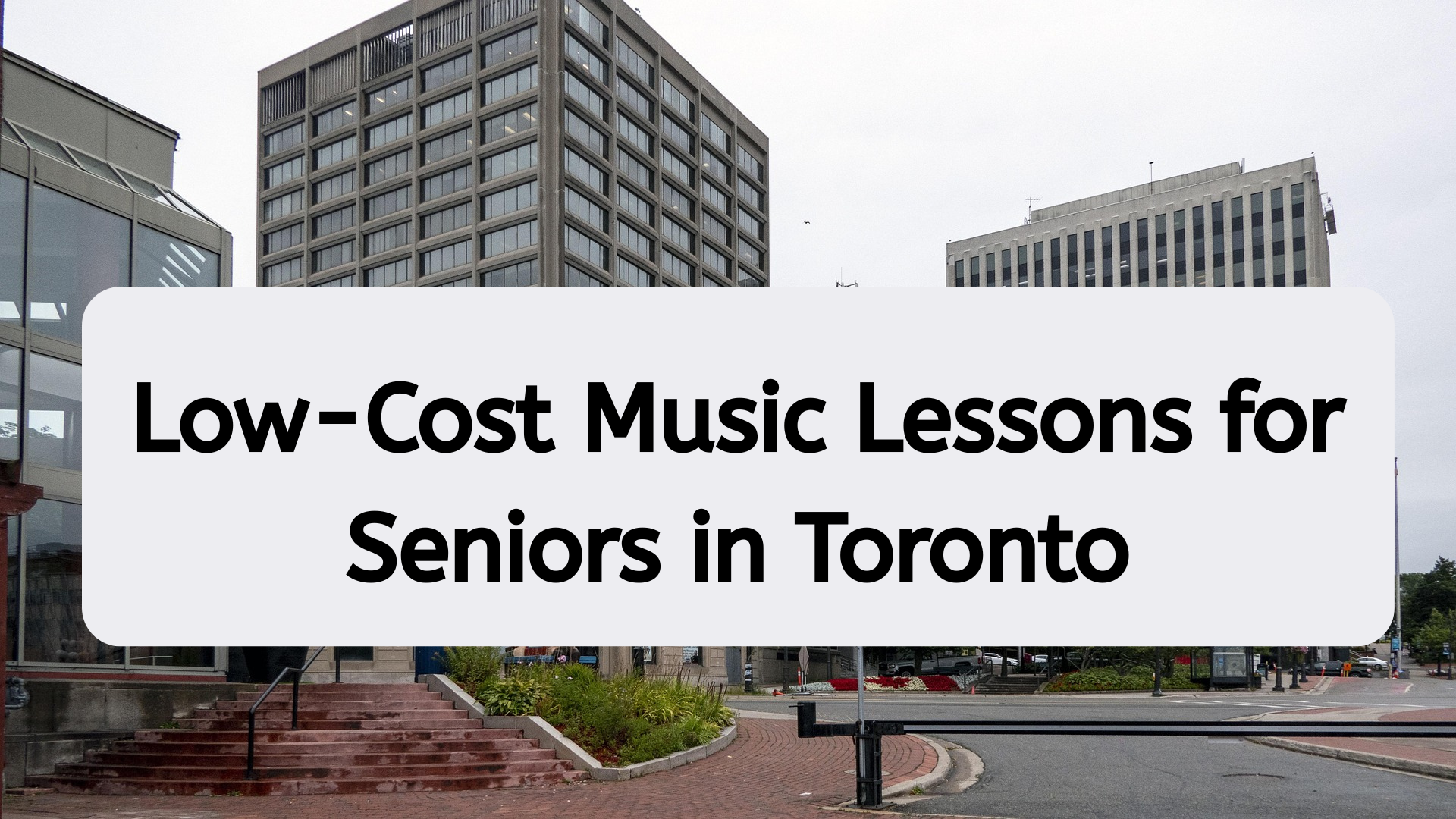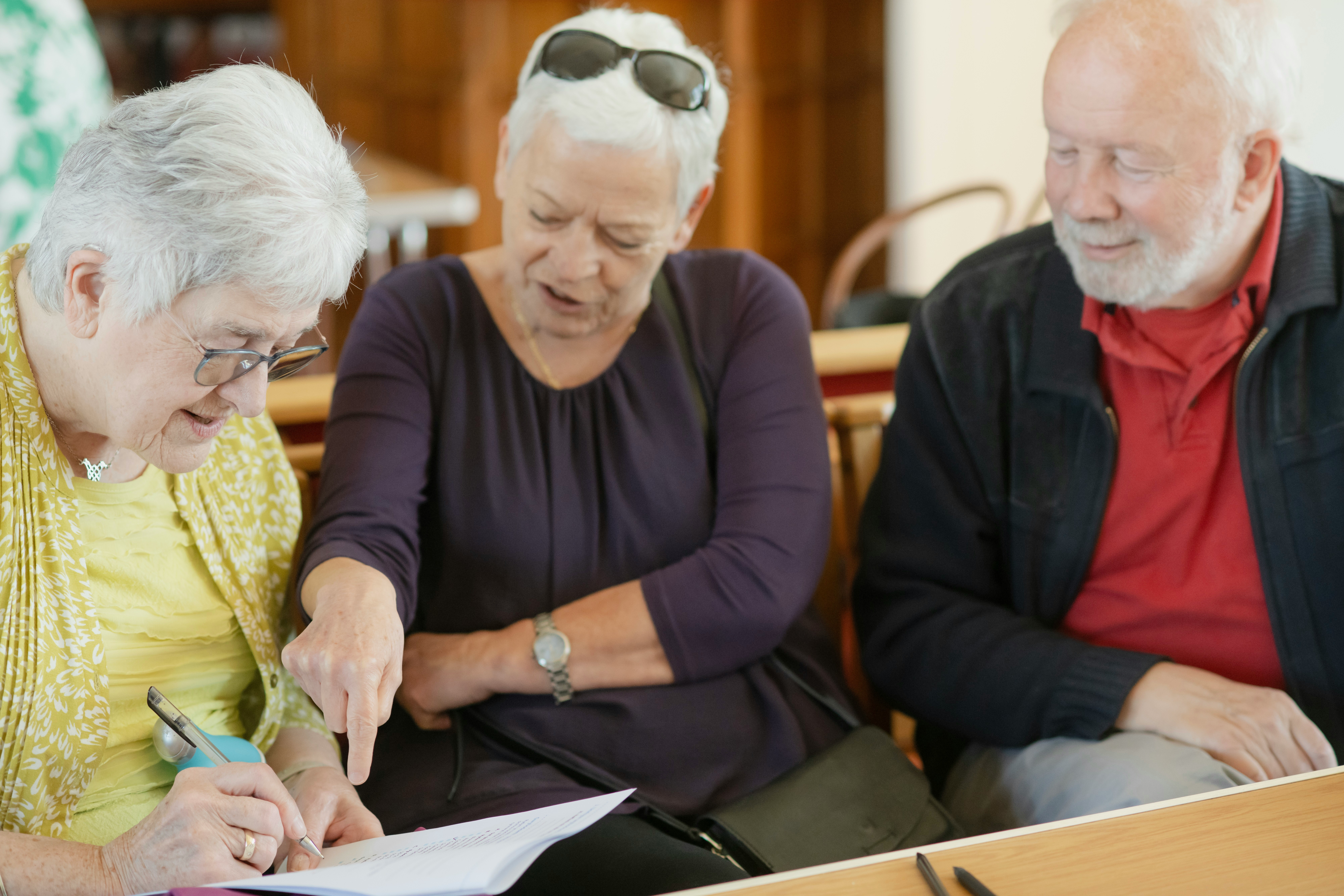Low-Cost Music Lessons for Seniors in Toronto (Guide for Canadians)

Retirement is a time to slow down, enjoy life, and explore passions you may have set aside over the years. For many seniors, music is more than just a hobby—it’s a doorway to improved health, mental sharpness, and social connection. Learning an instrument or taking singing lessons can bring joy, reduce stress, and even sharpen memory.
But here’s the challenge: many seniors assume that music lessons are expensive or only for the young. The good news? Toronto is full of low-cost or even free opportunities designed specifically for older adults. From community centres to nonprofits and online platforms, there’s something for every budget—and every skill level.
So why should you read this guide? If you’ve ever wanted to:
- Rediscover an old hobby like piano, guitar, or voice lessons
- Meet new friends while enjoying a shared activity
- Keep your mind sharp and body engaged through music
- Learn without breaking the bank
…then this guide is for you. We’ve done the research and rounded up the best programs, tips, and resources in Toronto so you can start your musical journey today without stress, confusion, or costly mistakes.
By the end of this post, you’ll know where to find affordable lessons, how to choose the right program, and the simple steps to get started, all tailored specifically for Canadian seniors.
How Much Do Music Lessons Cost in Toronto?
If you’re a senior in Toronto looking to pick up an instrument or brush up on your singing, you’re probably wondering: “How much will this actually cost?” The good news is, there are plenty of options that won’t break the bank.
Average Lesson Prices:
- Private Lessons: Piano, guitar, or voice lessons usually cost $40–$70 per half-hour in Toronto. While private lessons give you personalized guidance, costs can add up quickly.
- Group Lessons: Many community centers and local nonprofits offer group classes at $10–$25 per session, which is much more budget-friendly. Group settings also offer a bonus: socializing with fellow music lovers.
- Sliding Scale / Pay-What-You-Can: Some programs, especially nonprofit and student-run lessons, offer flexible pricing. This is ideal if you’re on a fixed retirement income.
Tips to Save:
- Check for introductory packages; many schools offer discounted rates for the first few lessons.
- Combine online and in-person lessons to cut costs. A private online lesson can sometimes be half the price of an in-person session.
- Look for senior discounts—many music schools, community centers, and even instrument stores in Toronto provide these.
Where to Find Low-Cost or Free Music Lessons for Seniors
Toronto is rich in community resources. Here are some of the best places to start your musical journey without overspending:
A. Community Centres & City Programs
Toronto Parks, Forestry & Recreation offers affordable group classes for seniors, ranging from beginner piano to choir groups. Classes are designed for all skill levels, and fees are typically $10–$20 per session. These programs also double as social hubs, which is perfect if you want to meet other retirees who share your passion for music.
B. Nonprofits & Charitable Organizations
- New Horizons Band: Designed for older adults, this nationwide initiative encourages learning and performing in community bands. Toronto chapters welcome seniors at very low costs, and instruments can often be borrowed.
- Encore Music & Community Programs: These organizations provide subsidized lessons for seniors, sometimes even free of charge if you qualify for financial assistance.
C. Local Colleges & Music Schools
- Royal Conservatory of Music: Offers student-led lessons for seniors at reduced rates, giving you access to highly trained musicians without the premium cost.
- Humber College: Music students often run practice lessons for seniors, sometimes under mentorship programs, at a fraction of regular pricing.
Pro Tip: Don’t hesitate to ask about scholarships, bursaries, or “trial sessions” for seniors. Many programs quietly offer them, but you have to inquire.
Online Music Lessons for Seniors (Canadian-Friendly Options)
If getting to a studio or community center is challenging, online lessons are a fantastic alternative. They allow seniors to learn at their own pace, right from home.
Benefits of Online Lessons for Seniors:
- Flexible Scheduling: Take lessons whenever it suits your lifestyle.
- Wide Variety: From piano and guitar to singing and ukulele, there’s something for everyone.
- Cost Savings: Many online platforms are cheaper than in-person lessons, some as low as $15–$30 per session.

Popular Options in Canada:
- TakeLessons.com & Preply: Many Canadian teachers offer affordable lessons with senior-friendly schedules.
- YouTube & Free Platforms: Free tutorials are plentiful, but they work best as a supplement to structured lessons.
- Zoom Group Classes: Community centers and nonprofits have started offering online choir and instrument sessions. These are often donation-based.
Senior-Friendly Tips:
- Ensure your device (tablet, laptop, or computer) has a stable internet connection.
- Pick lessons with step-by-step guidance and slower pacing to avoid feeling rushed.
- Join online communities for seniors learning music—these groups are supportive and motivating.
Group vs. Private Lessons: What’s Best for You?
Choosing between group and private music lessons depends on your learning style, social preferences, and budget.
Group Lessons:
- Social Interaction: Group classes are fantastic for making new friends. Many Toronto community centres offer group piano, guitar, or choir sessions specifically for seniors. You not only learn music but also build a supportive social circle which is invaluable for mental health in retirement.
- Cost-Effective: Since the cost is shared among multiple participants, group lessons are generally much more affordable. Some programs even offer “pay-what-you-can” options.
- Fun & Motivating: Learning alongside peers can encourage you to practice more regularly and try new pieces.
Private Lessons:
- Personalized Instruction: Private lessons are tailored to your pace and skill level. If you’re learning an instrument for the first time or need extra guidance, one-on-one instruction can accelerate your progress.
- Flexible Schedule: Many private teachers in Toronto offer evening or daytime slots, making it easier to fit into your retirement routine.
- Specialized Goals: Want to master a specific style like jazz, classical, or folk music? Private lessons allow you to focus exclusively on your interests.
Hybrid Approach: Consider combining both: join a weekly group class for social fun and supplement it with private sessions to target tricky techniques. This balance works well for many seniors.
Adaptive & Accessible Music Programs
Music isn’t one-size-fits-all especially for seniors who may face mobility, hearing, or dexterity challenges. Luckily, Toronto has programs designed with inclusivity in mind:
Music Therapy Programs:
- Programs like the New Horizons Band and local hospitals offer music therapy sessions that improve memory, cognitive function, and emotional well-being.
- These sessions are ideal for seniors with dementia or Parkinson’s, helping maintain motor skills and confidence.
Adaptive Instruments:
- Some community centres provide larger keys, ergonomic guitars, or adjustable chairs so you can play comfortably.
- Hearing-impaired seniors can benefit from amplified instruments or visual sheet music apps.
Accessibility & Inclusion:
- Toronto community centres ensure wheelchair access, elevators, and transportation assistance for seniors.
- Many programs are bilingual or multilingual, accommodating Toronto’s diverse population.
Tip: Always call ahead and ask about accessibility options the staff are usually happy to accommodate your needs.
Instruments on a Budget: How to Save Money
You don’t need a luxury instrument to enjoy music. Here’s how Canadian seniors can keep costs low without compromising quality:
Renting Instruments:
- Toronto music stores like Long & McQuade and Steve’s Music offer rental programs, which is perfect if you’re just starting out or trying a new instrument.
Buying Second-Hand:
- Check local classifieds (Kijiji, Facebook Marketplace) or community garage sales for gently used instruments.
- Many community programs accept donations or loan instruments to seniors.
Discounts & Grants:
- Ask about senior discounts many stores and music schools in Toronto offer reduced pricing.
- Some nonprofits provide grants or “music scholarships” for retirees who can’t afford instruments.
Smart Shopping Tip:
- Consider digital or hybrid instruments like electronic keyboards smaller, portable, and often less expensive than acoustic versions.
By combining budget-friendly instruments with adaptive programs and smart lesson choices, you can enjoy music as an enriching part of your retirement without breaking the bank.

How to Get Started Today
Learning music as a senior doesn’t have to be complicated, expensive, or intimidating. Whether you’ve always dreamed of playing the piano, strumming a guitar, or singing in harmony, Toronto has options that suit every budget and skill level. Here’s how you can get started today.
Step 1: Decide on Your Instrument and Learning Style
First, think about what type of music excites you. Do you enjoy classical piano, folk guitar, or joining a choir? Your choice will influence the type of lessons you pursue:
- Private lessons: One-on-one instruction is perfect if you want personalized guidance.
- Group lessons: Great for social interaction, motivation, and learning in a community environment.
- Online lessons: Ideal for seniors with limited mobility or busy schedules.
Step 2: Set Your Budget
Music lessons don’t have to break the bank. Here are some pointers:
- Community centres: Many Toronto recreation centres offer music classes for seniors under $20 per session.
- Nonprofit programs: Groups like New Horizons Band or Encore Music provide affordable, sometimes donation-based lessons.
- Student teachers: Colleges like Humber or the Royal Conservatory often have student-led programs at a lower cost.
Tip: Check if there are subsidies or grants available through Ontario seniors’ programs you may be eligible for discounts.
Step 3: Find a Local Program
Toronto has a variety of senior-friendly music programs. Some reliable starting points include:
- Toronto Parks, Forestry & Recreation: Search for “senior music programs” on the City of Toronto website.
- Community centres: Many local hubs host weekly music classes or jam sessions.
- Nonprofits & charities: Groups like Music for Seniors or Encore Music often advertise on social media and local bulletin boards.
Pro tip: Visit a class or open house before committing it’s a great way to see if the environment feels welcoming.
Step 4: Prepare Your Instrument
If you don’t already own an instrument, consider these options:
- Renting: Local music shops often rent instruments at a fraction of the purchase price.
- Buying second-hand: Check online marketplaces like Kijiji or Facebook Marketplace for gently used instruments.
- Community donations: Some programs provide free instruments for seniors with limited income.
Step 5: Schedule Your First Lesson
Once you’ve found a program, book your first lesson. Remember: starting slow is perfectly fine. Even 30-minute sessions once or twice a week can bring noticeable progress and joy.
Step 6: Make It Fun and Social
Learning music is not just about skill, it’s about enjoyment and connection.
- Attend local recitals or community jam sessions.
- Invite friends to join you in group lessons.
- Celebrate small milestones — learning a new song or chord is a big achievement!
Step 7: Track Your Progress
Keep a simple notebook or app to note:
- Songs learned
- Skills developed
- Lessons attended
This not only motivates you but also gives a sense of accomplishment — which is especially rewarding in retirement.
Final Thoughts
Starting music lessons as a senior in Toronto is easier than you think. With the city’s affordable programs, welcoming community centres, and online options, there’s truly something for everyone. The key is to start today, stay consistent, and have fun. After all, retirement is the perfect time to explore new passions and rediscover the joy of music!



